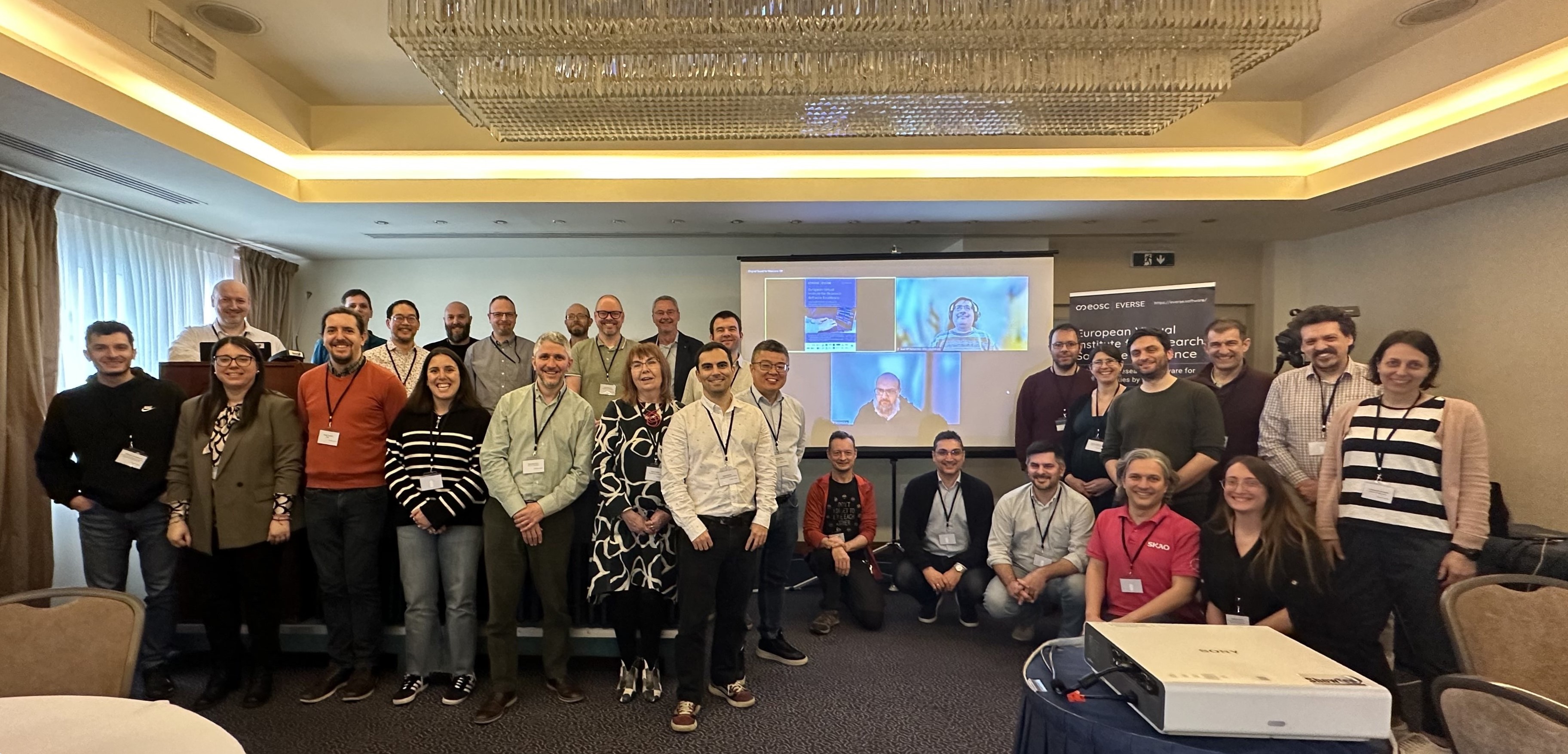Software is ubiquitous in Research. Communities have created numerous software applications that are essential to progress in their fields. The reliability, reusability and long-term sustainability of these applications, are critical aspects for future progress.
Funded by the European Commission, EVERSE aims to create a framework for research software and code excellence, collaboratively designed and championed by the research communities. This is achieved through close collaboration across the five EOSC Science Clusters ( https://science-clusters.eu ), as represented by the OSCARS project ( https://oscars-project.eu ), including astronomy and particle physics, environmental sciences, life sciences, photon and neutron science, and social sciences and humanities, as well as by engaging with national Research Software Expertise Centers. In the end, EVERSE will build a European Network of Research Software Quality setting the foundations of a future Virtual Institute for Research Software Excellence, and ultimately establishing a federated EOSC Competence Center for Research Software.

On 11-13 March 2024, EVERSE brought together the 18 consortium members for its official kick-off meeting in Thessaloniki, Greece, jointly with the OSCARS project. More than 30 people attended the event in person, with 17 actively participating remotely, demonstrating the effectiveness of a fully hybrid event.
During the first day of the meeting, Ignacio Blanquer (Universitat Politècnica de València, EOSC-A Director) set the stage by providing an overview of the EOSC Association with an emphasis on the challenges and expectations around research software. Building on this introduction, Fotis Psomopoulos (INAB|CERTH, EVERSE coordinator) presented the goal, ambition and overall vision of the project, emphasizing the three key challenges;
- defining a common framework and understanding of research software quality together with the science communities,
- marshalling an arsenal of tools and services to be used across communities in order to facilitate research software quality, and
- establish a framework to recognize and reward all activities around research software (implementation, maintenance, curation and sustainability).
The second day had a strong start, kicking off the activities with a “fireside chat” between Carole Goble (University of Manchester) and Joris van Eijnatten (Netherlands eScience Center), challenging the participants to reflect upon four statements:
- “All communities exist beyond EOSC (and beyond Europe!)”,
- “Good enough is excellent”,
- “Ease of use is crucial” and
- “Research Performing Organizations & funders have responsibilities”.
The lively debate on these topics allowed participants to move towards more in-depth and detailed discussion on the practical aspects of the project. Starting from an overview of the pilots, each one selected and driven by one of the science communities, the participants tackled the key elements of the project; from the community-led “good enough” practices and the respective tools and services for research software quality and FAIRness, to the open questions around capacity building and recognition of software-related activities, as well as the framework to establish a European Network of research software quality. Closely connecting to the latter point, an invited talk by Caxton Murira (Science for Africa Foundation) gave the Pan-African research software community of practice (RESCOPE), allowing us to define the first steps towards expanding the EVERSE network beyond Europe. The second day concluded with a number of break-out discussions, aiming to: define the next short-term activities towards: creating the cross-community catalogue of Infrastructure, tools, services and best practices on software quality/curation/assessment; designing a first version of the Research Software Quality toolkit (RSQkit), an open knowledge base to gather and curate expertise that will contribute to high-quality software and code across different disciplines; and defining the requirements towards evaluation, metrics and indicators.
The third day of the event was fully dedicated to a joint discussion between EVERSE and OSCARS, demonstrating the close relationship of these two projects. With an overall attendance of 80 members from both projects, the day started with a short overview of both projects delivered by Fotis Psomopoulos (INAB|CERTH, EVERSE coordinator) and Giovanni Lamanna (CNRS LAPP, OSCARS coordinator). The entire day was then dedicated to cross-project breakout sessions, fleshing out the existing complementarities and mapping out practical joint activities. The Science Clusters in Horizon Europe, represented by OSCARS, aim to acknowledge software achievements, raise awareness of the foundation approach, and promote career development. EVERSE aims to leverage the expertise on research software quality across domains, building a federated competence center on software excellence. Together with the clusters, the goal is to demonstrate successful cross-fertilization efforts and showcase economies of scale, and the clusters also enable a participative research ecosystem, promoting provenance tracking and contributing to evolving assessment methodologies.
Under the umbrella of the EOSC ecosystem, EVERSE will build on the work of the previous activities within EOSC (such as the Infrastructures for Quality Research Software Task Force), take full advantage of the outputs and knowledge from past projects (such as FAIR-IMPACT), and work in close collaboration with relevant projects (such as OSTrails and GraspOS) with open channels of communication, in order to maximize the impact of the expected outcomes and ensure that all stakeholders are actively engaged.
To learn more, join EVERSE’s community on
- LinkedIn ( https://www.linkedin.com/company/eosc-everse ),
- FOSStodon ( https://fosstodon.org/@eosc_everse ),
- Zenodo ( https://zenodo.org/communities/everse ) and
- X ( https://twitter.com/eosc_everse ).
The project, is funded by Horizon Europe call HORIZON-INFRA-2023-EOSC-01-02 (#101129744).
Click here to download Kick off meeting report (.pdf).